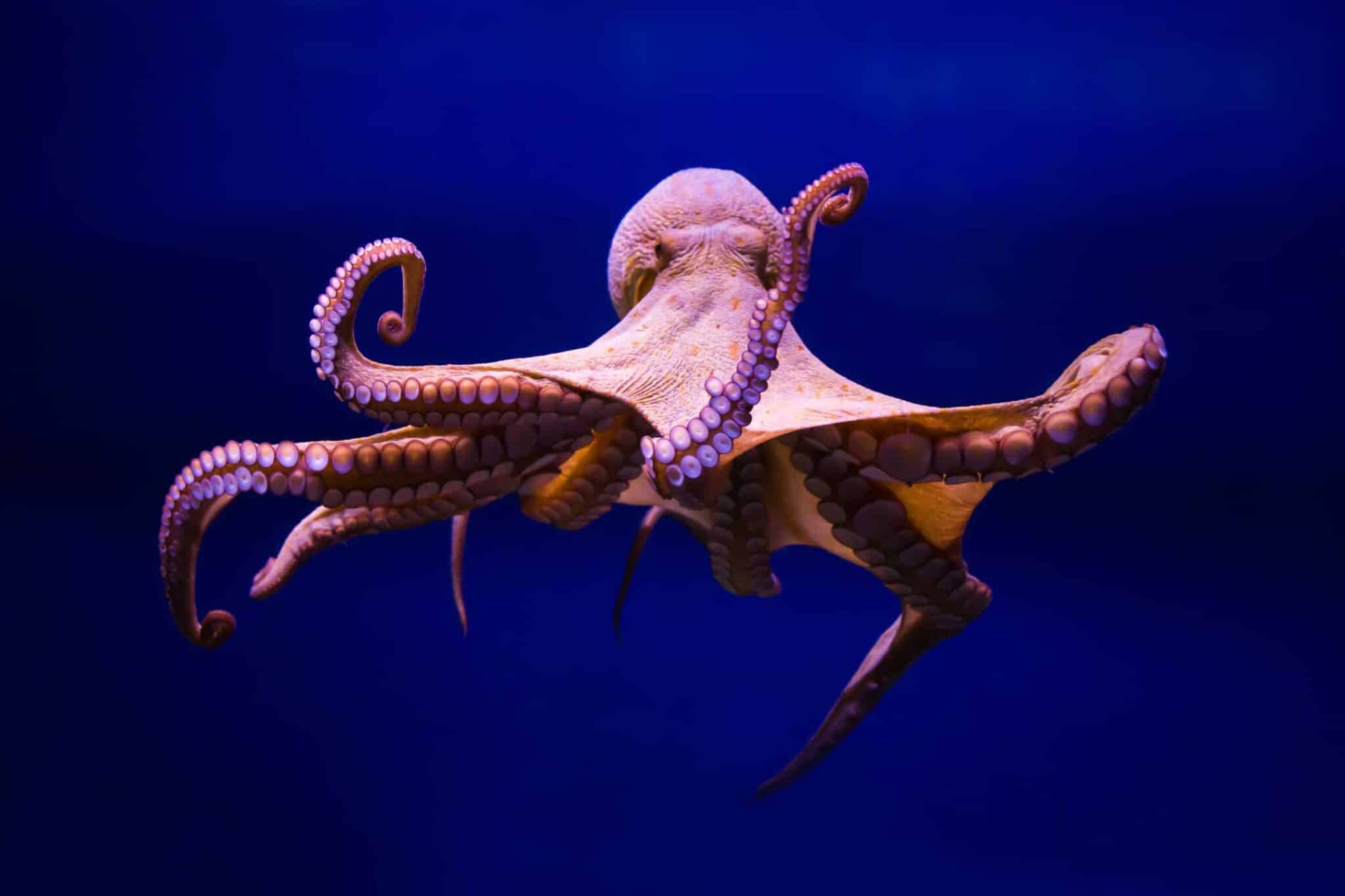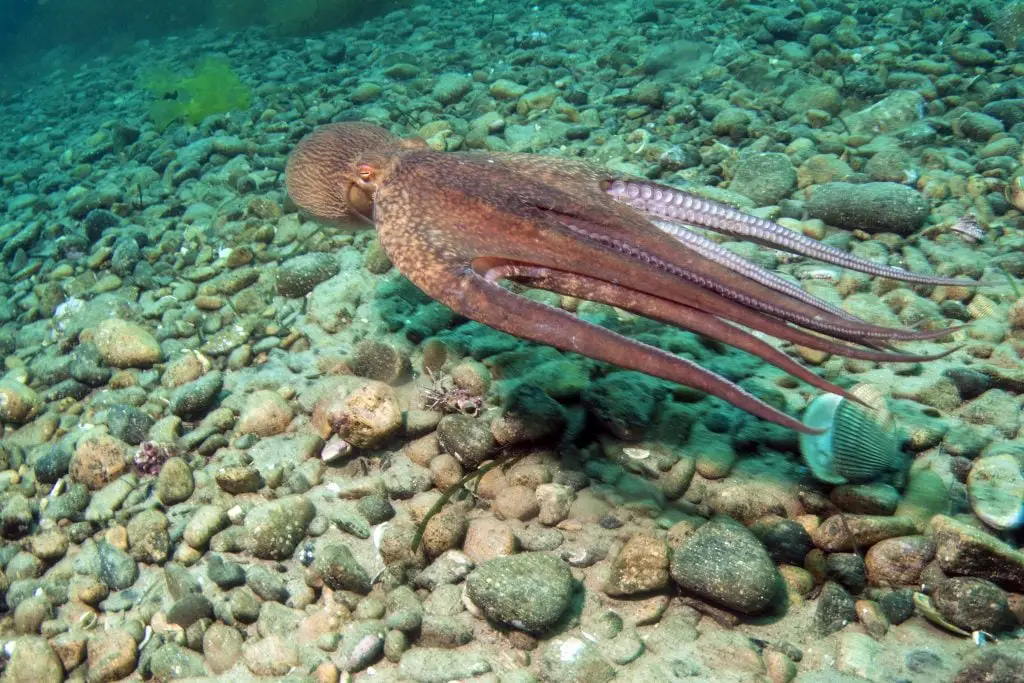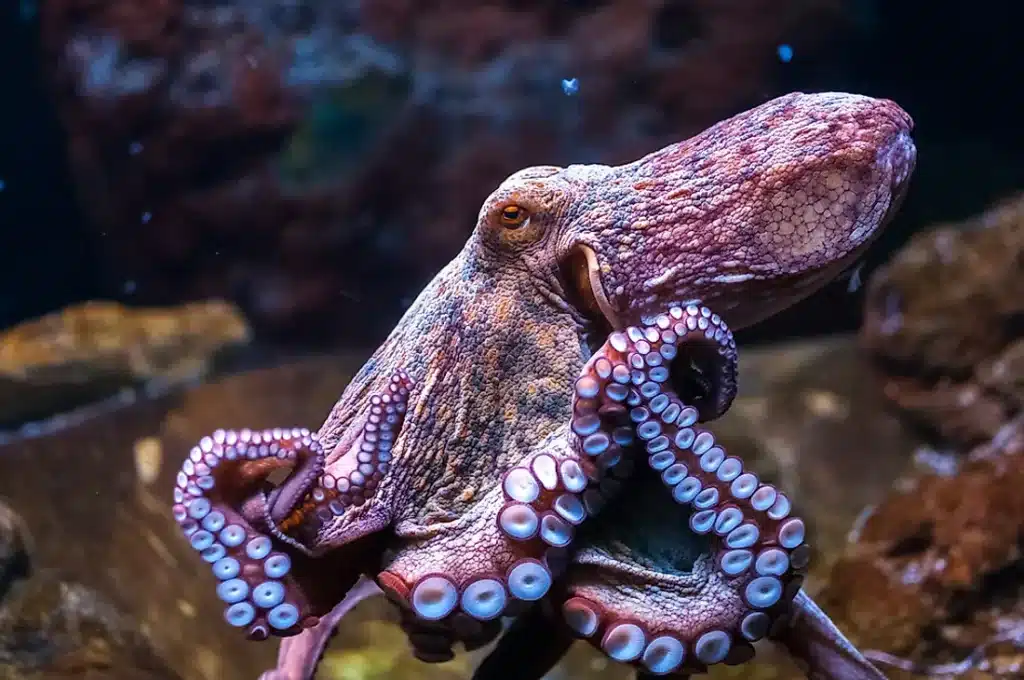Are There Freshwater Octopus

Introduction
Are There Freshwater Octopus: The existence of freshwater octopus has long been shrouded in mystery, captivating the imaginations of scientists, explorers, and enthusiasts alike. While the image of octopuses primarily conjures up visions of deep-sea creatures with incredible intelligence and dexterity, it may come as a surprise that these remarkable animals are not confined solely to the briny depths of the world’s oceans.
Are there indeed freshwater octopus species, distinct from their marine counterparts, adapting to a life in rivers, lakes, and other inland water bodies? Exploring this question delves into a world of biological intrigue, ecological adaptation, and the resilience of life forms across diverse environments.
We will delve into the unique challenges and opportunities that freshwater environments pose for octopuses, the mysteries surrounding their behavior and adaptation, and the implications for our understanding of the diversity of life on Earth. Join us as we navigate the murky waters of this captivating enigma, seeking to unravel the truth about the existence of freshwater octopus live.

Why are there no freshwater octopus?
It’s all to do with osmosis. “It is probable that they never developed a sodium pump that would help them cope with osmotic change in freshwater,” Norman explains. Freshwater dwellers have salty blood relative to the water around them.
The absence of freshwater octopuses is a perplexing biological mystery that has intrigued scientists for years. Octopuses are undoubtedly fascinating creatures, renowned for their intelligence, adaptability, and remarkable evolutionary journey. However, these cephalopods are overwhelmingly marine-dwelling, with no confirmed species adapted exclusively to freshwater environments. Several factors contribute to the apparent absence of freshwater octopuses:
- Physiological Challenges: Octopuses are adapted to the specific conditions of the ocean, including its salinity, pressure, and temperature. Adapting to the vastly different conditions of freshwater ecosystems would require significant physiological changes, which may be evolutionarily challenging.
- Predation and Competition: Freshwater ecosystems can be hostile environments, with different predators and competitors compared to the ocean. Octopuses may struggle to find a niche where they can thrive without being outcompeted or preyed upon by other freshwater species.
- Migration and Dispersal: Octopuses typically have a relatively short lifespan and limited mobility. The transition from the sea to freshwater environments would require substantial migration and adaptation, which may be unlikely given their life history traits.
- Lack of Fossil Evidence: The absence of fossil evidence of freshwater octopuses also raises questions about their historical existence. Fossils of marine octopuses are abundant, but no such fossils have been found in freshwater deposits.
While the absence of freshwater octopuses remains a tantalizing mystery, it is likely due to a combination of physiological challenges, competition, predation, and historical factors. The octopus’s remarkable evolutionary journey has primarily unfolded in the ocean, making the adaptation to freshwater environments a rare and uncharted territory in the cephalopod world.
How long can an octopus live in fresh water?
An octopus can’t live in freshwater because it’s a saltwater creature – it has evolved to live in sea water which has a much higher salinity than freshwater. Very few animals can adapt from one to the other. There are no freshwater octopuses.
Octopuses are primarily marine creatures, well-adapted to the saltwater environments of oceans and seas. When placed in fresh water, their physiology faces significant challenges. Octopuses have specialized cells, called chromatophores, that regulate their coloration and camouflage abilities. In freshwater, these cells become less effective, making it harder for the octopus to conceal itself and avoid predators.
Furthermore, octopuses possess specialized gills designed for extracting oxygen from seawater. In freshwater, these gills struggle to extract sufficient oxygen, putting stress on the octopus’s respiratory system. The osmotic balance, crucial for maintaining bodily functions, is also disrupted in a freshwater environment, potentially leading to dehydration and electrolyte imbalances.
Under experimental conditions, some octopuses have been observed to survive in freshwater for a short period, usually ranging from a few hours to a few days. However, this is highly stressful and potentially harmful to the animal. Prolonged exposure to freshwater can lead to severe health issues and ultimately prove fatal for the octopus.
In the wild, octopuses would never naturally encounter freshwater bodies, as they inhabit exclusively marine environments. Therefore, it is imperative to ensure their well-being by keeping them in appropriate saltwater habitats. Any attempt to keep an octopus in freshwater should be approached with extreme caution and under the guidance of experienced marine biologists or aquarists.
Are octopus or squid freshwater?
There are no octopuses or any cephalopods at all that live in freshwater. With the exception of a couple species of squid that have been occasionally caught in estuarine waters of Australia, cephalopods won’t tolerate anything but full strength seawater.
Octopuses and squid are primarily marine creatures, meaning they are adapted to live in saltwater environments like oceans and seas. Their physiology is finely tuned to the specific conditions of these habitats. Both species possess specialized structures like gills, which are designed to extract oxygen from seawater. In freshwater, these organs struggle to extract sufficient oxygen, leading to respiratory distress.
Furthermore, octopuses and squid have cells called chromatophores that facilitate color change and camouflage in their natural marine environments. In freshwater, these cells become less effective, compromising the animal’s ability to hide and protect itself.
While some species of squid, like the Humboldt squid, are known to venture into estuarine areas with lower salinity levels, they are not true freshwater creatures. Octopuses and squid do not naturally inhabit freshwater bodies like rivers or lakes, and any attempt to introduce them into such environments can lead to stress, health issues, and ultimately, their demise.
Octopuses and squid are unequivocally marine organisms, and their well-being is best maintained in carefully regulated saltwater environments that mimic their natural habitats. Attempting to acclimate them to freshwater should only be done under the expert guidance of marine biologists or experienced aquarists.
Can you buy a freshwater octopus?
Despite some fun legends about giant lake octopuses, there’s no such thing as a freshwater octopus. And that’s because octopuses’ bodies are built for saltwater, and no known octopus species in the very long history of octopus species have adapted to live out its life in freshwater.
In the realm of exotic pets, the idea of owning a freshwater octopus may seem intriguing and enigmatic. However, the reality is that obtaining a freshwater octopus as a pet is a complex endeavor, often bordering on the impossible. Unlike their saltwater counterparts, which are occasionally available in the aquarium trade, freshwater octopuses are exceedingly rare and challenging to acquire.
Freshwater octopuses belong to a small group of cephalopods known as the Amphioctopus, and they are primarily found in Southeast Asia, inhabiting slow-moving rivers and streams. Their habitat requirements, behavior, and dietary needs are still not well understood, which makes keeping them in captivity a daunting task. Additionally, local conservation efforts and legal restrictions in some regions may further limit the availability of these creatures.
Furthermore, ethical concerns surrounding the collection and trade of freshwater octopuses also play a role in their scarcity as pets. Sustainable practices and responsible pet ownership should always be a top priority when considering exotic animals.
While the idea of owning a freshwater octopus as a pet may be fascinating, the practicality and ethics surrounding their acquisition make it a challenging and often unfeasible endeavor for most individuals. Aspiring pet owners are encouraged to explore more suitable and readily available options within the world of exotic pets.
Can an octopus exist outside of water?
It might seem abnormal, but most species of octopus can survive out of water for 30-60 minutes, allowing them to slink from pool to pool in search of food when the tide goes out. We rarely see these ‘air raids’ because cephalopods typically hunt at night!
Octopuses are remarkable marine creatures, known for their intelligence, adaptability, and unique abilities. However, their existence outside of water is extremely limited and brief. Octopuses are marine animals with bodies specifically adapted for life in the ocean. They have gills that extract oxygen from water and a soft, gelatinous body structure that relies on buoyancy in water to maintain its shape.
When taken out of water, an octopus faces several challenges. Firstly, it can’t breathe in the same way it does underwater, as it lacks lungs or other respiratory organs suitable for terrestrial life. Oxygenated water is essential for their survival, and without it, they quickly suffocate. Secondly, their body structure is designed for buoyancy in water; on land, the lack of water support can cause their bodies to collapse under their own weight, leading to physical stress and injury.
Octopuses are highly specialized for their underwater environments, and they are not adapted to survive for extended periods outside of water. In some rare instances, octopuses have been observed briefly crawling on land, but these instances are typically short-lived and often end with the octopus returning to the water or perishing due to the challenges of terrestrial life.
Are blue ring octopus poisonous?
Blue-Ringed Octopus Venom
The TTX that a blue-ringed octopus injects is so deadly that 1 milligram of it can kill a human. It’s one of the most potent toxins on earth, and there is no antidote.
The blue-ringed octopus is indeed highly poisonous. In fact, it’s considered one of the most venomous marine animals in the world. Despite its small size and seemingly delicate appearance, this cephalopod possesses a potent venom that makes it a dangerous creature.
The blue-ringed octopus gets its name from the striking iridescent blue rings that appear on its body when it feels threatened or agitated. These rings serve as a warning sign to potential predators, indicating the octopus’s venomous nature. The venom is produced by special glands and delivered through its beak, which it uses to bite and inject venom into its prey or potential threats.
The venom of the blue-ringed octopus contains powerful neurotoxins, which can paralyze the muscles and, in severe cases, lead to respiratory failure and death in a matter of minutes. Despite its small size, its venom is potent enough to kill a human, making encounters with this octopus a potentially life-threatening situation.
It’s crucial to exercise extreme caution and avoid handling or provoking blue-ringed octopuses in their natural habitat. Any encounter with these creatures should be treated with the utmost care and respect, and immediate medical attention is required if someone is bitten.
Why are octopuses not found in freshwater?
Octopuses are fascinating creatures known for their remarkable adaptability and intelligence. However, one environment where you won’t find them is freshwater. There are several reasons why octopuses are not found in freshwater habitats.
Firstly, octopuses are marine animals, specifically adapted to the unique conditions of the ocean. They possess specialized structures called gills that allow them to extract oxygen from seawater. Freshwater contains significantly less dissolved oxygen than seawater, making it challenging for octopuses to breathe in such an environment. This oxygen imbalance would deprive them of the essential respiratory support they require to survive.
Secondly, octopuses have evolved to maintain osmotic balance with their surroundings. In freshwater, where the salt concentration is much lower than in their natural marine habitat, they would experience osmotic stress. This could lead to the loss of bodily fluids and disrupt their internal equilibrium, ultimately endangering their health.
Finally, octopuses are susceptible to predation by various freshwater species, including fish and amphibians, which they wouldn’t encounter in the ocean. Their soft bodies and limited defenses make them vulnerable in freshwater ecosystems.
Octopuses are not found in freshwater due to the fundamental differences in oxygen levels, osmotic balance, and the presence of potential predators, all of which make these environments inhospitable for these remarkable marine animals.
Can octopuses survive in freshwater temporarily?
Octopuses are marine animals adapted to saltwater environments, but they can survive temporarily in freshwater under certain conditions. However, such situations are typically exceptional and not conducive to their long-term well-being. When an octopus is exposed to freshwater, it faces several challenges:
- Osmotic Stress: Octopuses are osmoconformers, meaning their bodies maintain a salt balance that matches the salinity of the surrounding seawater. In freshwater, where salt levels are much lower than in their natural habitat, octopuses may experience osmotic stress. Water can enter their bodies, causing cells to swell and potentially leading to cellular damage.
- Respiratory Challenges: Octopuses respire by extracting oxygen from water through their gills. Freshwater has lower oxygen content and different chemical properties than seawater, which can make it challenging for octopuses to extract enough oxygen to sustain themselves.
- Acclimation: In some instances, octopuses may temporarily adjust to the lower salinity of freshwater through acclimation. This process can take time and varies among species. Some octopuses are more adaptable than others.
- Stress and Disorientation: The transition to freshwater can be highly stressful for octopuses. It can disorient them, affect their behavior, and compromise their overall health.
While octopuses can survive short exposures to freshwater, it’s not a natural or ideal environment for them. Prolonged exposure to freshwater is detrimental to their health, and they are best suited to their native marine habitats, where they have evolved to thrive.

Conclusion
The quest to determine the existence of freshwater octopus has been a captivating journey filled with both scientific curiosity and cultural intrigue. While the evidence remains inconclusive, our exploration has shed light on several critical aspects of this enigmatic topic.
First and foremost, it is clear that the existence of freshwater octopus is a subject that continues to fascinate and spark the imagination of people worldwide. Whether driven by folklore, anecdotal accounts, or genuine scientific investigation, the allure of uncovering a hidden aquatic realm remains potent.
Many accounts, though compelling, lack the concrete evidence required to conclusively confirm the existence of distinct freshwater octopus species. Instead, they highlight the complexity of ecological adaptation and the importance of continued exploration and research in our understanding of aquatic ecosystems.
As we conclude this exploration, one thing remains certain: the natural world is a realm of infinite surprises, and the possibility of freshwater octopus, while yet unproven, serves as a reminder of the mysteries that still await discovery. Whether or not these elusive creatures truly exist, the pursuit of knowledge and our curiosity about the world’s hidden wonders will continue to drive us to explore and understand the intricacies of life on Earth.



